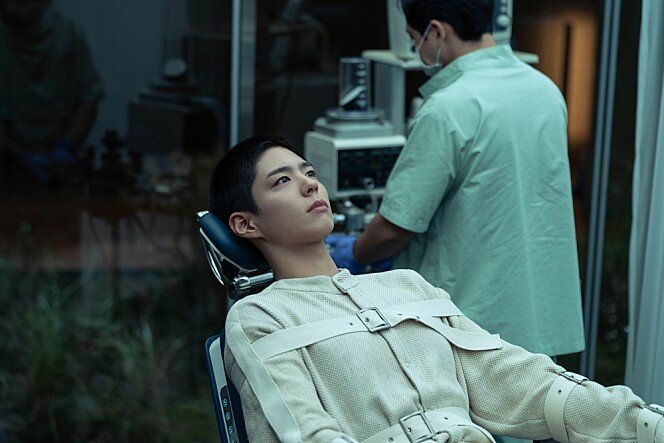Movie Review: 'Seobok' (2021)
Korean Title: 서복
English Title: Seobok
Running Time: 1 hour, 54 minutes
Release Date: April 15, 2021
Genre: Sci-Fi, Action
Language(s): Korean, English
Cast: Gong Yoo (Train to Busan), Park Bo Gum (Record of Youth)
Directed by: Lee Yong Ju (The Silenced)
Written by: Lee Yong Ju (The Silenced)
Seobok is a science fiction film about a retired National Intelligence Service agent, Min Ki Hoon (Gong Yoo) and his encounter with the first human clone, Seo Bok (Park Bo Gum) who was created out of stem cell cloning and genetic manipulation. After a terrorist attack threatening Seo Bok’s safety, Min Ki Hoon is pulled from retirement to transfer him to a safe place.
Possessing the keys to eternal life due to his body’s rapid ability to reproduce disease-fighting cells, Seobok’s character is based on the historical reference of Chinese alchemist, Xu Fu, (South Korean name: Seo Bok) who was sent by Emperor Qin Shi Huang to find the ‘elixir of life’ during Qin Dynasty China.
Seo Bok was supposed to be released in December 2020, but due to COVID-19 protocols, it was postponed and ended up being released both in Korean theatres and online streaming service TVING on April 15, 2021. As of the writing of this post, Seo Bok is sitting in 2nd place on the Korean Weekly Box Office.
Story
Seo Bok (Park Bo Gum) is the first human clone created out of stem-cell cloning and genetic manipulation. His body reproduces disease-fighting proteins and anti-cancer cells at a rapid speed and can potentially be the key for eternal human life. Multiple forces are trying to get their hands on Seo Bok because of this. After a terrorist attack on one of the members working on the top-secret project, the NIS is tasked to complete a mission to transfer Seo Bok to a safe place.
Given the sensitivity of the mission, the NIS elects to recall Min Ki Hoon (Gong Yoo) from retirement to complete the task. Terminally-ill with cancer and with no more than six months left to live, Ki Hoon accepts the mission on one condition: Once safe and sound, Ki Hoon can take advantage of Seo Bok’s stem cells to help him get rid of his illness - ultimately extending his life.
Among Seo Bok’s ability to produce cells that will ultimately rid humankind of any type of fatal disease, he is also able to control the elements (it’s explained as “controlling air pressure”) around him. This is a side effect that even the team of scientists that created him are not able to explain. For the most part, Professor Shin Hak Sun (Park Byung Eun), one of the scientists in charge of the project, describes Seo Bok as “an undying being”.
During the mission, the transport convoy is ambushed by American forces as they attempt to take Seo Bok. After they escape the Americans, Professor Shin recommends Ki Hoon to return Seo Bok to the research lab until they’re able to regroup for a new plan.
Through the journey back, Seo Bok is forced to interact with the physical world and real people - which he’s never been able to do. Having complete knowledge of the reason behind his creation, he asks Ki Hoon many thought-provoking questions to understand the way humans operate, their greed and motivation to continue living.
The Verdict
Overall Rating: 5/10
Well, we don’t necessarily consider him human. If a potato grows out of a tomato seed - what are you supposed to call it?
Professor Shin on Seo Bok
Gong Yoo and Park Bo Gum teaming up for a science-fiction project is quite interesting... The premise of human cloning and the moral dilemmas that come with it was also exciting for me given that Korean films have been historically great at depicting the way humans act amidst greed and power situations like these.
However, I braced for impact immediately as the plot got mad suspicious in the beginning when Professor Shin mentioned that Seo Bok’s ability to bend elements was an “unexplained side effect”, because that’s usually a writing red flag screaming: We’re not sure how to mobilize the rest of this plot, so we’re going to leave this here - just in case we need a reason to conclude the story.
Surely by the end of the movie, they’ve gone overboard and totally ballistic with the element bending arc. It pretty much made a majority of the ending scenes feel out of place and looking like a first-generation X-Men movie - and that is such a shame given all the build up established until the middle of the film.
To its very core, Seo Bok strives to be a big philosophical reflection on the concepts of purpose, death, eternity and how those things affect the way humans live their lives. It goes to show that human beings’ greatest motivation to live is really drawn from their mortality. So if you’re into existentialist stuff like that, there are a lot of inspirational and quotable-quotes scattered across the film for you jot into your notes. Other than that, I’m afraid that not even Gong Yoo or Park Bo Gum were able to save the film as similar to its characters, the story didn’t have direction and was ultimately bound to die.










